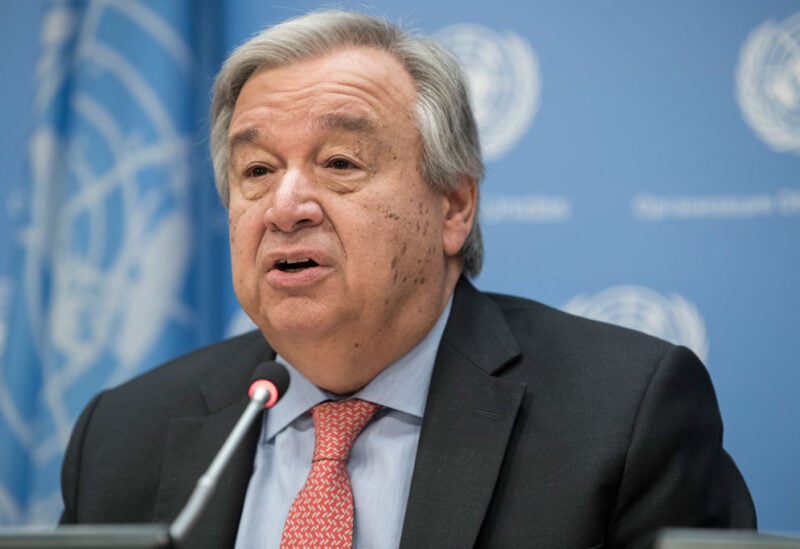
United Nations Secretary-General Antonio Guterres
As he begins his second term as UN Secretary-General, Antonio Guterres said Thursday that the world is worse than it was five years ago due to the COVID-19 pandemic, the climate crisis, and geopolitical tensions that have sparked conflicts all over the world — but, unlike US President Joe Biden, he believes Russia will not invade Ukraine.
In an interview with The Associated Press, Guterres stated that the appeal for peace he issued on his first day as UN Secretary-General on January 1, 2017, as well as his priorities in his first term of attempting to prevent conflicts and address global inequalities, the COVID-19 crisis, and a warming planet, have not changed.
“The secretary-general of the United Nations has no authority,” Guterres stated. “We can wield power. I’m able to convince. “I can mediate, but I don’t have any authority.”
Before becoming UN Secretary-General, Guterres stated that he saw himself as “a convener, a mediator, a bridge-builder, and an honest broker to assist find solutions that benefit everyone concerned.”
On Thursday, he stated that they are things “I need to do every day.”
As an example, the secretary-general stated this week that he spoke with the African Union’s envoy Olusegun Obasanjo, twice with Kenya’s President Uhuru Kenyatta, and once with Ethiopia’s Prime Minister Abiy Ahmed in an attempt to end the conflict in Ethiopia between the government and forces in the embattled Tigray region.
“I hope that we are in a position where a ceasefire of hostilities is soon conceivable, and that is where I am putting most of my efforts,” Guterres said.
As another example, Guterres stated that he has been on the phone with Mali’s military commanders, who just postponed elections slated for next month until 2026, in order to lower the timeframe. He stated that he discussed “how to ensure that in Mali, there is an acceptable calendar for the transition to a civilian government” with Mali’s military ruler, President Assimi Goita, three presidents from the 15-nation West African regional group ECOWAS, Algeria’s prime minister, and the African Union’s leader.
Guterres expressed optimism that Mali’s military commanders will recognize the need of accepting “a reasonable interval” before elections. “All my efforts have been on establishing conditions for bridging this difference and allowing ECOWAS and the government of Mali to come to a settlement with an acceptable delay for the elections,” the secretary-general added.
According to Guterres, the UN Security Council, which has the authority to maintain international peace and security by imposing sanctions and authorizing military action, is divided, particularly among its five veto-wielding permanent members. Russia and China frequently disagree with the United States, the United Kingdom, and France on major topics, including fresh sanctions imposed on North Korea on Thursday.
On the topic that has everyone’s attention right now — whether Russia, which has stockpiled 100,000 troops on Ukraine’s border, would attack the former Soviet republic — Guterres stated, “I do not believe Russia will invade Ukraine, and I hope that my opinion is accurate.”
What gives him the impression that Moscow will not invade whereas Biden and others believe Russian President Vladimir Putin will send soldiers into Ukraine?
“Because I do not believe in a military solution to the issues that exist, and I believe that the most sensible approach to tackle those problems is via diplomacy and serious discourse,” Guterres explained, emphasizing that an invasion would have “awful repercussions.”
The secretary-general stated that “of course, we have been in communication” with top Russian officials, despite the fact that the UN is not actively involved in the Ukraine situation.
On Friday, Guterres will address the 193 UN member countries in the General Assembly on his plans for 2022.
He singled out three immediate priorities that “worry me enormously”: the lack of vaccinations in large parts of the world, particularly in Africa; the need to cut emissions by 45 percent this decade in order to meet the international goal of limiting future global warming to 1.5 degrees Celsius (2.7 degrees Fahrenheit); and the world’s “extremely unjust” financial situation, which favors rich countries.
Many poor nations have scant resources, big debts that are expanding at far greater interest rates than in Europe or North America, no immunizations, and “suffer disproportionately from the effects of climate change,” according to Guterres.
“We need profound change in our international financial system to ensure that there is greater equity in how resources are accessible to allow for recovery (from COVID-19) to be feasible everywhere,” he added.
On another key topic, Guterres emphasized that the Afghan people cannot be collectively punished for the Taliban’s “wrongdoings,” thus it is critical to dramatically boost humanitarian aid “because the Afghans are in a grave position with the possibility of death through famine.”
“More than half of the population is in critical need of humanitarian help,” he added, adding that money must be pumped into the economy to guarantee Afghan banks run and physicians, teachers, engineers, and other workers get paid in order to avoid the country from collapsing.
The issue of recognizing the Taliban government is up to member states, according to Guterres, but the UN has been pressing the Taliban, which took power in August as US-led NATO forces left after 20 years, to ensure human rights, particularly women’s and girls’ rights to work and education, and to make the government more inclusive and reflective of Afghanistan’s diverse population.
The secretary-general said he will be attending the Beijing Olympics in February “which is not a political act” but “to be present when all the world comes together for good — for a peaceful message.”